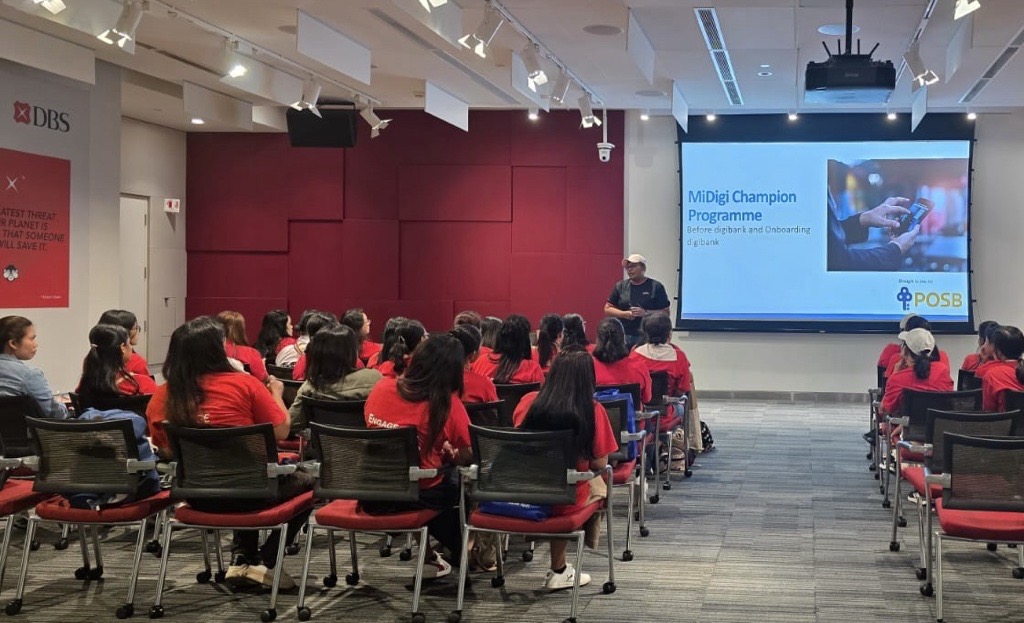
The MiDigi Ambassador Programme was established to promote financial inclusion among work permit holders, many of whom struggle with language barriers, digital banking, and fear of financial scams. The initiative shifts away from top-down approaches, instead empowering migrant workers to become community ambassadors who guide and uplift their peers.
Launched in 2023 with 42 ambassadors, the programme expanded in 2024 to include migrant domestic workers and now boasts 259 ambassadors. These individuals are trained in digital and financial literacy, scam and phishing awareness, and provide support in native languages, breaking down linguistic and cultural barriers.
The key objective is to help work permit holders achieve digital independence, enabling them to bank online, make cashless payments, and remit money securely. Through peer-led support, these potentially intimidating tasks become approachable and safe.
To reinforce this, DBS launched the Work Permit Holder Multilingual Website on 1 July 2024. As the first such resource in six native languages within the bank, it offers step-by-step guides and videos for ambassadors and workers alike.
This program redefines how support is delivered, community-driven, language-accessible, and focused on real inclusion.
Migrant workers are a vital part of Singapore’s economy, contributing significantly to industries such as construction, shipbuilding, and domestic services. Despite their essential role, they often face social, financial, and digital exclusion. Many live in dormitories, work long hours, and have limited access to formal support networks. This reality creates significant barriers to financial inclusion and confidence—especially in an increasingly digital banking landscape.
Recognising this, DBS took a proactive role in designing a solution that supports migrant workers not just as customers, but as valued members of society. Guided by our purpose of making banking more inclusive, we employed the 4D problem-solving framework—Discover, Define, Develop, Deliver—to co-create solutions that are meaningful, accessible, and sustainable.
Pillar 1: Flywheel Iteration through Continuous Discovery & Engagement (2023)
The programme began with immersive sessions conducted across dormitories, recreation centres, and event sites. These were not formal surveys but open, trust-based conversations with migrant workers. Weekly workshops and helpdesks enabled DBS teams to meet workers where they were and understand their struggles and support needs.
From these engagements, four key barriers emerged:
These insights directly informed the programme’s design and ensured that solutions were relevant, inclusive, and rooted in lived experiences.
Pillar 2: Ambassador Selection & Training Design
To drive grassroots impact, DBS partnered with trusted organisations like the Centre for Domestic Employees (CDE) and Migrant Workers’ Centre (MWC) to identify migrant worker ambassadors from within existing community networks. These individuals demonstrated initiative, empathy, and multilingual skills, making them natural peer leaders.
The training was co-developed using insights from Pillar 1 and focused on practical knowledge and confidence-building. It included:
Sessions were informal, highly interactive, and accessible to those with limited literacy or digital experience. By leveraging trusted partners and equipping ambassadors to be credible and approachable, the programme built strong community ownership.
Pillar 3: Community-Based Execution & Scaling
Once trained, ambassadors began engaging directly with their peers at dormitories, recreation centers, public helpdesks, and events. They answered questions, conducted outreach, and supported workers one-on-one.
Ambassadors received digital toolkits and participated in regular check-ins and re-training sessions to keep content fresh and relevant. This support system ensured that ambassadors stayed motivated and aligned with evolving needs.
The approach scaled organically through trust and word-of-mouth. Migrant workers felt more comfortable approaching peers, making financial tools and digital platforms more accessible and less intimidating.
The MiDigi Ambassador Programme was created to empower migrant workers to navigate digital banking confidently, with support from trained peers who speak their native languages. In 2025, the impact is clear.
Digital adoption rose significantly: digital payments (refers to Debit Cards, NETS, PayLah! and PayNow) increased by 31% year-on-year, while cash withdrawals fell by 3%. The Digital-Cash Ratio improved by 8 percentage points, reaching 56%, reflecting a strong shift toward cashless behaviour.
Digital confidence improved across the board: active users rose to 75% (up from 71%), new remittance users grew by 13%, and call demand dropped 12%, indicating greater self-service capability.
The journey had its challenges. Many workers were hesitant to use digital services due to language barriers, low confidence, and fear of scams. To address this, ambassadors received training in scam prevention and financial literacy, allowing them to build trust and provide relatable guidance.
With over 250 ambassadors (102% increase from 2024) in 2025 and growing, the programme has redefined how support is delivered—making banking accessible, safe, and empowering for every work permit holder.
